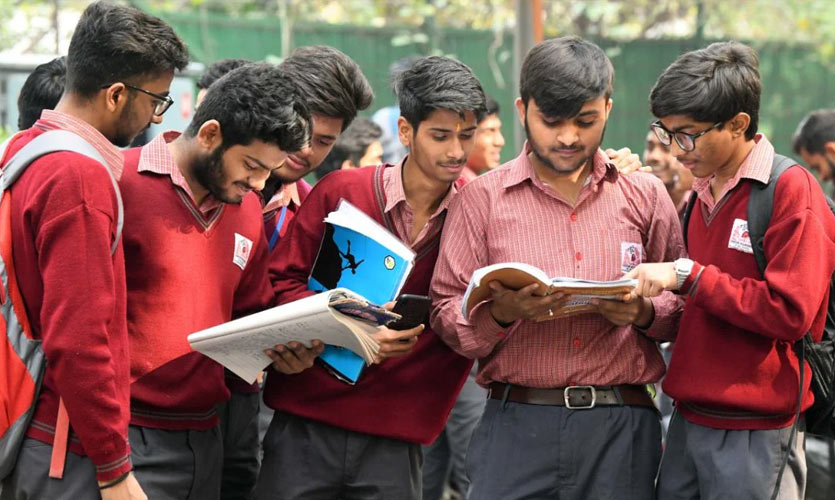In announcing its new assessment scheme on Thursday, the Central Board of Secondary Education (CBSE) has brought the uncertainty surrounding classes 10 and 12 board examinations to an end. Instead, it has started a new dilemma, fueling students’ anxiety over what is going to come next. After the declaration of the cancellation of board exams in an earlier announcement students felt mixed emotions, but this second announcement regarding the grading criteria has them worried about several things.
The marking scheme for class 12 students consists of their class 10, 11 and 12 grades. This will include three components: a class 10 component (30%) based on the top three subjects in board exams, a class 11 component (30%) based on the examination and a class 12 component (40%) based on unit tests, mid-terms, and pre-boards. On the other hand, a maximum of 100 marks will be allocated per subject for students in class 10; 80 of those marks will be allocated by the school based on the academic performance of the students throughout the year.
The system gives priority to board exam scores for some students, making it a key to all the locked doors in universities. Some students have argued that putting so much weight on previous results and assessments will only mislead the assessment. Compared to class 12 exams, the class 11 exams are decidedly easier, but since the marking is done by internal examiners there is room for bias. Due to the weightage system, some schools are under the suspicion that they could be unfairly disadvantaged.
Dr. Sindhura, managing director of the education conglomerate Narayana Group, in conversation with Money Control, said that there will be “uniformity and no student will be disadvantaged”. She explained however, that there could be discrepancies since these exams were administered by schools and marking schemes differed from school to school, which put some students at a disadvantage.
In order to reduce bias in the assessments and to maintain a high level of synchronisation it is imperative that a standard marking policy be implemented. In the absence of a standard policy, students are concerned about the inclusion of class 10 board exam results, while others are concerned with their performance in class 11.
“I believe that considering the performance of class 10 and 12 is fair but taking 30 per cent of final exams of class 11 is not as it is often not considered as the most serious academic year in comparison to class 10 and 12 and might effect on the overall result,” said Anant Jain, a class 12 student of Vivekanand School, to the Indian Express.
“Online examinations conducted in the past year are not a true representation of a student’s capability and potential but considering Class 10 and 11 marks do even out things and help provide a result that a student could have achieved in an offline examination,” said student Devansh Saraf to the Hindu. He said any assessment of his performance would not be an accurate assessment of what an individual could have achieved in an offline exam conducted under normal circumstances. Nevertheless, he felt that the CBSE’s criteria were as fair as they could possibly be.
Ketki Dalmiya, a parent of a class 12 student, shared her concern with the Hindustan Times. “She had major surgery and was not able to attend school. In such a scenario, if class 11 marks were to be included then it may affect her score overall. My daughter wants to go abroad for her further education and these marks are very crucial to her. But due to this decision taken by the board, there is a lot of uncertainty,” said Dalmiya. According to her, students who are preparing for further exams tend not to pay attention to the school scores that they obtained in class 11. “Even if the board is including only 30 marks, it will affect the overall performance of the child and overall scorecard,” added Dalmiya.
Read more: Maharashtra Board Exams Postponed Amid The COVID-19 Surge In The State
With such high cutoffs, students worry about getting into their preferred universities. Aspirants who plan on studying abroad fear the new criteria as it may significantly impact the standard of assessment. Navin Pastakhia, a class 12 student in Bardez, Goa, expressed his concern to Money Control. “I wish the assessment decision was taken earlier. If my proposal is rejected, I will have to stay back in India and pursue the course here. Because wasting one academic year is not a viable option,” he said. Currently, he is applying to five institutes in New Zealand for hotel management courses and is concerned that a late mark sheet submission might result in the rejection of his application. Getting the vaccination on time is another important concern so that the deadline for being present on campus is met.
Apart from these concerns, there is confusion over what will happen to students who have missed out on internal assessments and practical tests due to COVID-19. The situation is also unclear for students who switched to the CBSE board after class 10. With every passing day, the board is failing to clarify ambiguities surrounding the most pressing concerns of students. While some have proposed having an entrance test that will assess their merits for admission to their desired universities, things remain unclear from the side of the board and the centre.










